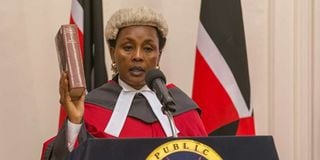Premium
Legal dilemma in appointment of Maraga successor as top judge

Philomena Mwilu during her swearing-in as Deputy Chief Justice at State House in Nairobi on October 28, 2016.
The search for Chief Justice David Maraga’s successor will take off on the back of deep divisions at the Judicial Service Commission and a looming constitutional crisis on the composition of the Supreme Court.
While the recruitment is a straightforward matter — a vacancy is declared by the JSC, aspirants submit their applications, and the best candidate is vetted by the National Assembly before being appointed by the President — the controversy that has stalked the last days of Mr Maraga at the helm has complicated things.
His succession has brought legal and moral complications that could lead the judiciary further down a path that makers of the 2010 constitution seem not to have foreseen. While Mr Maraga’s assumption of office was peaceful and seamless, his exit is a direct contradiction as vicious wars have broken out over how to handle his replacement.
The JSC has since September had internal wrangles over whether to start recruiting the next Chief Justice before or after Mr Maraga leaves office officially on January 12.
Article 166 of the constitution simply lays out how the Chief Justice is hired, but does not state when the recruitment shall be done. Technically, the decision to recruit a successor before or after the sitting Chief Justice exits office lies with the JSC.
In June, 2016, Dr Willy Mutunga, the first Chief Justice under the 2010 Constitution, voluntarily retired. The JSC at the time opted to recruit a successor after Dr Mutunga left office. Mr Maraga was declared the best in interviews conducted two months after Dr Mutunga’s retirement.
Mandatory retirement age
Barely five years after assuming office, Mr Maraga is just about to hit the mandatory retirement age of 70 and will be proceeding on terminal leave today. The JSC met on September 16 and resolved that a committee comprised of deputy chair Mercy Deche, Justice Mohammed Warsame, Justice David Majanja, Ms Elizabeth Ominde, Mr Macharia Njeru and Mr Patrick Gichohi would create a roadmap for recruitment of a new CJ.
The committee resolved that it would be prudent to start recruitment of a new CJ before Mr Maraga leaves office, arguing that the process is long.
But when the committee presented its report to the full JSC panel on September 30, Justices Maraga, Mwilu and Warsame teamed up to oppose the move. The trio wanted the recruitment to start after January 12. For three hours, the commissioners tried to reach a resolution but neither side was willing to back down.
Mr Maraga then adjourned the meeting after commissioners agreed to take time to try and reach a consensus instead of voting on the issue. The JSC was to meet on October 16, but Mr Maraga cancelled the sitting an evening before.
The LSK representative to the JSC, Mr Macharia Njeru, protested, saying there could be some individuals within the judiciary trying to manipulate the recruitment process. And, in the event that the recruitment of a successor stretches beyond January 12, a situation that is now more likely is that Deputy Chief Justice (DCJ) Philomena Mwilu will temporarily assume some of the roles of the CJ.
While she will handle some of the functions of a CJ, there are some roles that will have to await the appointment of a substantive Chief Justice as the law does not provide for anyone to hold the top-most office on an acting capacity.
Bench of judges
Some of the functions of the CJ cannot be assigned to a deputy and will have to await the appointment of a successor. For instance under Article 165, section 4 of the constitution, only the CJ can constitute a bench of judges to hear matters that have to be presided over by more than one judge.
Cases that raise substantial questions of law that require the court’s interpretation are usually heard by a bench of judges.
Under Article 261, section 7 of the constitution, only the CJ can advise the President to dissolve Parliament. In addition, only the CJ can issue rules to guide the conduct of court proceedings, and the duty cannot be assigned to a deputy.
Despite nothing being legally wrong with Justice Mwilu’s partial assumption of power, the judge is facing four petitions for removal before the Judicial Service Commission.
Tax evasion
DCJ Mwilu has been accused of tax evasion, irregular recovery of loan collateral and abuse of office. The allegations arise from a series of loan dealings with collapsed Imperial Bank
If the petitions were to succeed before a new Chief Justice is appointed, there would be a serious constitutional crisis.
While the Constitution provides that the senior most judge of the Supreme Court will temporarily assume the instruments of power, there would still be a problem with hearing of cases.
With the JSC yet to replace Justice Jackton Ojwang who retired in February, success of the removal petitions against DCJ Mwilu would mean that the Supreme Court would also lack the required minimum number of five judges to preside over cases.
Senior lawyers are seemingly divided on whether Justice Mwilu will be an acting CJ.






